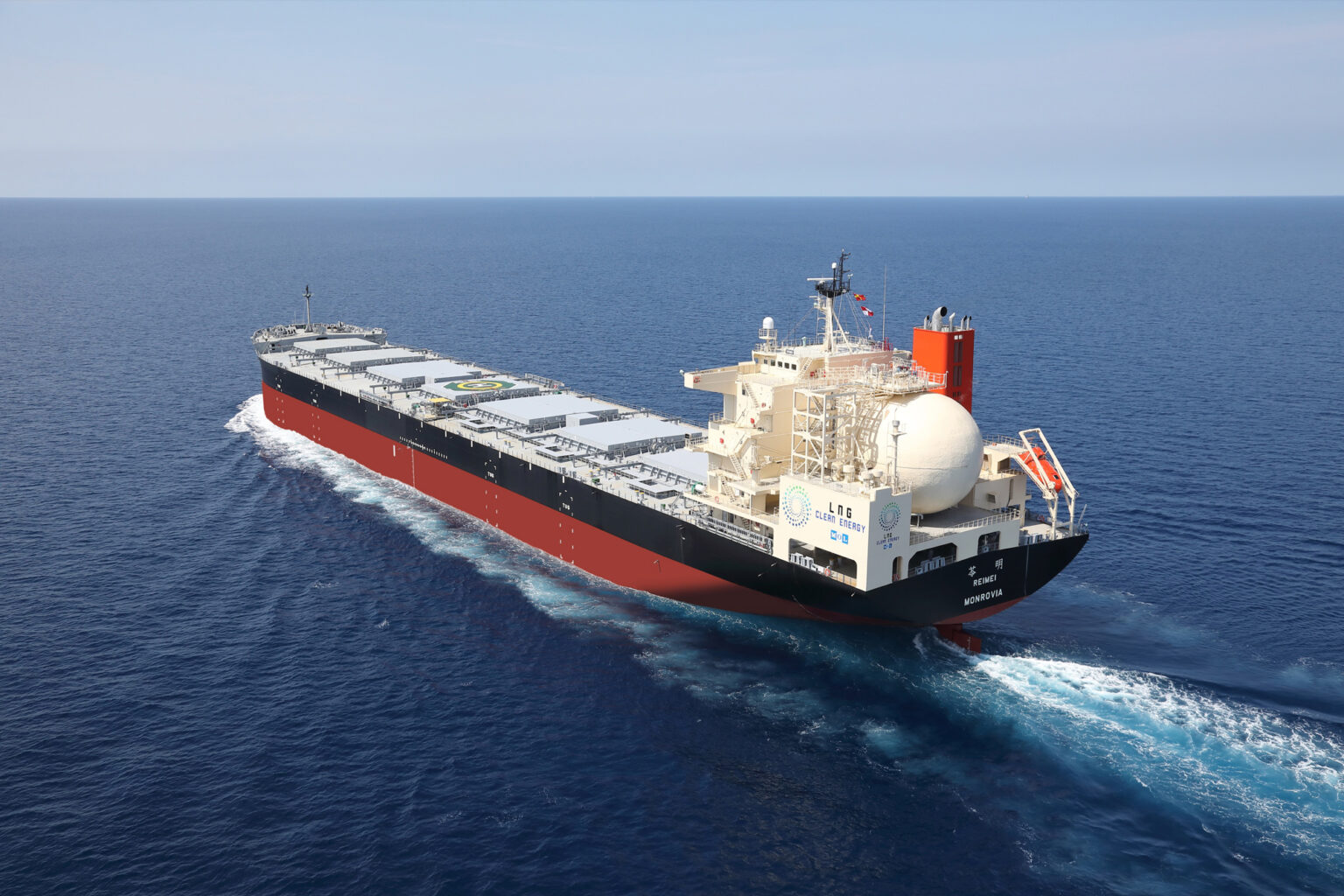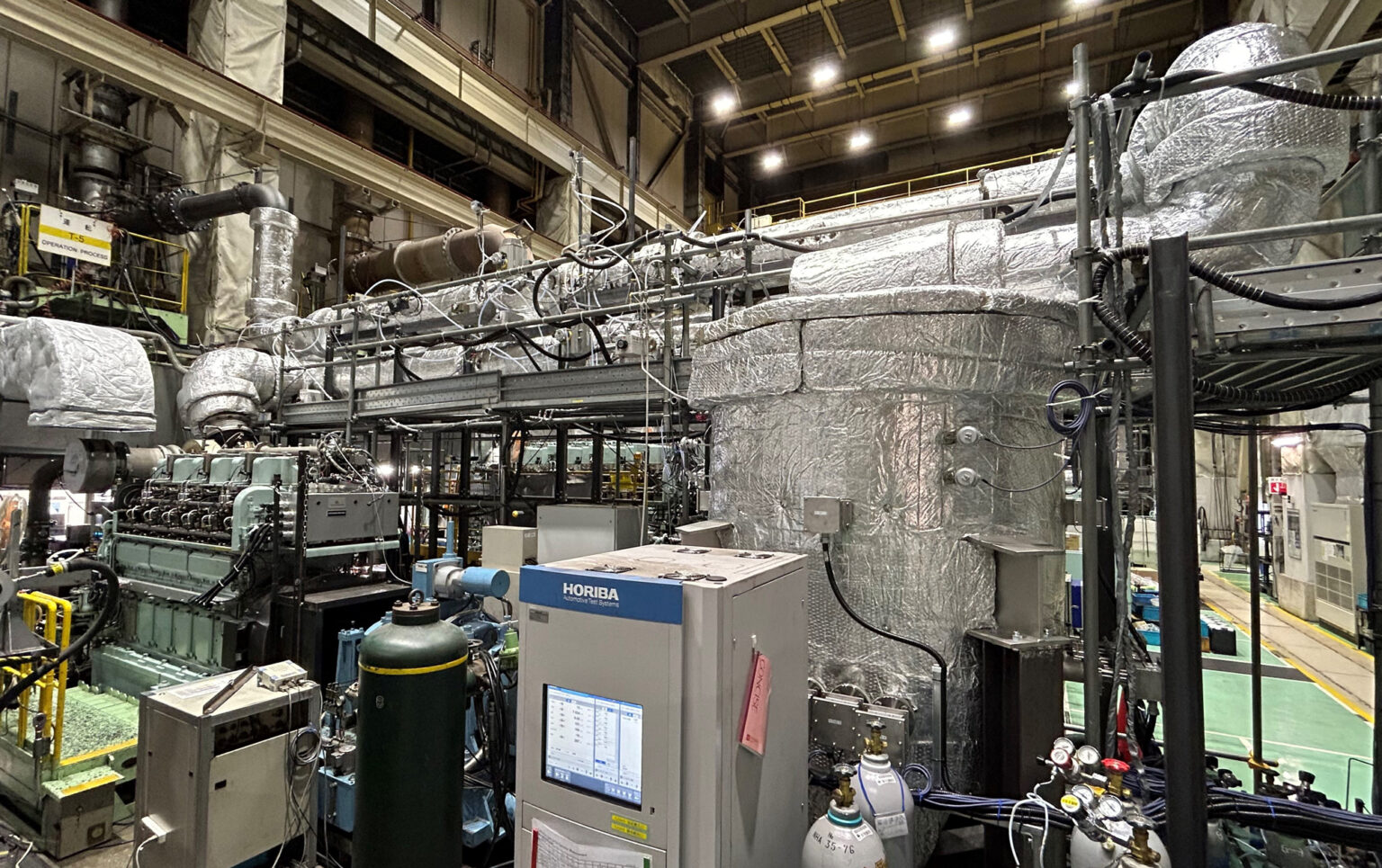“Critical Role For LNG”
New report from Lloyd's Register Report highlights LNG’s growing adoption, its cost-effectiveness under tightening emissions regulations, and the urgent need to address methane slip

Lloyd’s Register’s (LR) latest Fuel for Thought report reveals that liquefied natural gas (LNG) remains the dominant alternative marine fuel readily available to the shipping industry.
Fuel for Thought: LNG reveals a significant resurgence in orders for LNG-capable vessels, with an expanding global fleet and rapidly growing bunkering infrastructure. LR’s latest analysis notes LNG’s strong market position, with 1,381 dual-fuel vessels in service as of December 2024 and a further 849 on order – representing a 61% fleet expansion. Currently, 14% of all vessels on order will have LNG dual-fuel engines installed.
The data confirms LNG’s continued appeal, particularly in segments such as container shipping and car carriers, where its adoption is expanding rapidly: Clarkson Research predicts that the LNG-fuelled fleet (excluding gas carriers) will grow to represent around 24% of the merchant fleet by 2050
Economic analysis within the report indicates that with IMO mid-term measures within the projected boundaries, LNG remains the most cost-effective fuel choice for foreseeable transition pathways up to 2049. LR’s modelling suggests that LNG-fuelled vessels could generate substantial compliance savings compared to ships running on very low sulphur fuel oil (VLSFO), with additional benefits from regulatory mechanisms such as pooling.
However, the report cautions that LNG’s long-term sustainability depends on tackling methane slip – unburned methane emissions that reduce its overall GHG advantage.
While LNG can provide immediate emissions reductions, its ability to meet stricter targets in the 2040s will depend on advances in cleaner LNG production, particularly through biomethane and synthetic e-LNG, as well as the development of onboard carbon capture technologies.
Panos Mitrou, LR’s Global Gas Segment Director, said: “As regulations emerge that place a real financial impact on greenhouse gas emissions, ship operators are realising that LNG is one of few low carbon fuels to be available immediately, widely, with established safety protocols and at relatively predictable cost.
“There are several opportunities to improve the long-term sustainability of LNG. These are already being addressed and the measures that are being worked on – from cleaner production and supply processes to bio-LNG and OCCS, through the uptake of onboard methane abatement technologies, as well as regulatory acceptance of these improvements –
are likely to increase uptake of LNG even further.”
Peter Keller, Chairman of lobby group SEA-LNG, who provided the foreword for the report, says: “SEA-LNG is proud to support this comprehensive report, Fuel for Thought: LNG, which delves into the multifaceted benefits and challenges of LNG as a marine fuel. This report provides valuable insights into the technological advancements, regulatory frameworks, and market trends that shape the future of LNG in the shipping industry.”
The report also highlights specific examples of innovation, such as the use of high-manganese steel for LNG tanks, which has significantly reduced costs while maintaining cryogenic handling properties. This technology has been successfully implemented in vessels like the Advantage Tankers LLC’s VLCCs, demonstrating the increasing uptake of LNG across diverse vessel segments.
Mehmet Cebeci, Fleet Manager, Advantage Tankers LLC, said: “The analysis produced by Lloyd’s Register serves as a crucial resource for industry professionals navigating the evolving landscape of marine fuels. We believe LNG is the most viable source to comply with both current and upcoming long-term emission regulations, offering a cleaner, more sustainable alternative to traditional marine fuels.”
AET has LNG-powered vessels classed by LR. Nick Potter, President & CEO of AET, said: “LNG is a key component of AET’s Decarbonisation Strategy, providing immediate emissions reductions while we also invest in net-zero carbon solutions. Through our tiered decarbonisation strategy, we are integrating energy efficiency technologies, innovative propulsion systems, and future fuel capabilities, including ammonia, to help meet our 2030 GHG emissions intensity target.
“While LNG is a viable option today, its long-term role will depend on developments in bio-LNG, synthetic LNG, and the commercial and regulatory landscape for fuels such as methanol, ammonia, and hydrogen. We see LNG as part of a multi-fuel future, complementing alternative energy sources as we move towards our 2050 net-zero goal as part of the MISC Group.”
Meanwhile SEA-LNG says IMO’s proposed decarbonisation agreement means the UN Agency “has held firm to its principles of goal-based, technology neutral regulation”. In a statement it adds: “While many details need to be decided this provides a clear decarbonisation framework for the global shipping industry and will enable all fuel pathways, be they methane (LNG), methanol or ammonia, to compete on a level playing field.”
According to SEA-LNG, the framework, assuming it is adopted in October, means that ship owners can confidently continue to invest in LNG-dual fuel engine technologies, secure in the knowledge that the LNG, or more accurately, methane pathway to decarbonisation is recognised by the IMO. A pathway that is practical, realistic, scalable and low cost compared with those offered by other alternative marine fuels. Critically, on the supply side, the proposed regulations will further incentivise the growth we are seeing in liquefied biomethane bunkering and catalyse additional investments
in e-methane.
Cutting methane slip
Japanese companies Hitachi Zosen, Mitsui O.S.K. Lines and Yanmar Power Technology report achieving a 93.8% reduction rate, at an engine load rate of 100%, while developing technology to reduce the methane slip from LNG-fuelled vessels through use of a catalyst and engine improvements. This project was adopted by the country’s New Energy and Industrial Technology Development Organization (NEDO), and the reduction rate was confirmed by ClassNK.
The project aims to achieve a 70% or more reduction in methane slip by combining methane oxidation catalyst and engine improvements during the six-year period from fiscal 2021 to fiscal 2026.
In 2022, Hitachi Zosen and the Yanmar developed the Methane Oxidation Catalyst System which reduces methane slip by oxidising methane emitted from marine engines fuelled by LNG and received NK’s Approval in Principle. In December 2023, a land-based test achieved a reduction rate of 93.8%, exceeding the target, by combining engine improvements with exhaust gas recirculation and a methane oxidation catalyst system, and the vehicle was the first in the world to receive the SOF from NK. A demonstration test started last autumn of 2024 on the large coal carrier REIMEI operated by MOL.
Strong interest in LNG supply in Singapore
The Maritime and Port Authority of Singapore (MPA) has received 14 proposals under its Expression of Interest (EOI) to scale up the supply of LNG as marine fuel. The MPA says that 18 companies took part in the EOI, including energy companies, fuel suppliers, traders, bunker operators, and storage providers. Eight of the submissions included bio-methane and e-methane solutions. It asserts: “The range of submissions reflect the industry’s readiness to support sea-based LNG reloading to complement existing onshore infrastructure and supply more options.”
MPA says it will work with shortlisted companies to carry out sea-based LNG reloading trials by the second half of 2025. It will also develop plans to promote the use bio- and e-methane as marine fuels in Singapore. The trials will assess scalability, technical feasibility, safety, operational readiness, and digital connectivity, as well as measures to address methane slip.
Insights from the proposals and trials will inform MPA’s review of the LNG bunkering licensing framework, “including enhancements to existing supply arrangements to better meet the needs of international shipping”.

get
in touch

Constructive Media
Constructive Media
Hornbeam Suite
Mamhilad House
Mamhilad Park Estate
Pontypool
NP4 0HZ
Tel: 01495 239 962
Email: ibia@constructivemedia.co.uk

On behalf of:
IBIA London Office
Suite Lu.231
The Light Bulb
1 Filament Walk, Wandsworth
London, SW18 4GQ
United Kingdom
Tel: +44 (0) 20 3397 3850
Fax: +44 (0) 20 3397 3865
Email: ibia@ibia.net
Website: www.ibia.net

Emails
Publisher & Designer: Constructive Media
ibia@constructivemedia.co.uk
Editor: David Hughes
anderimar.news@googlemail.com
Project Manager: Alex Corboude
alex@worldbunkering.net
